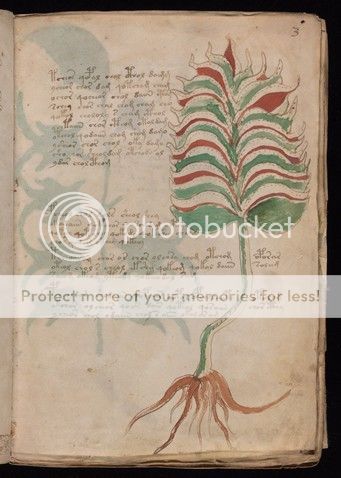 Books with mysterious reps, bizarre origins or that contain puzzles of any kind fascinate me. What's not to like about the world's longest secret novel, created by the incredible self-taught writer/illustrator Henry Darger, or curses like the one that supposedly haunts Sangorski's bejewelled edition of the Rubaiyat of Omar Khayyam, or exactly what sort of secrets Ripley really put in his alchemist's scroll? Yet no book quite matches the alluring (and enduring) mystery of The Voynich manuscript.
Books with mysterious reps, bizarre origins or that contain puzzles of any kind fascinate me. What's not to like about the world's longest secret novel, created by the incredible self-taught writer/illustrator Henry Darger, or curses like the one that supposedly haunts Sangorski's bejewelled edition of the Rubaiyat of Omar Khayyam, or exactly what sort of secrets Ripley really put in his alchemist's scroll? Yet no book quite matches the alluring (and enduring) mystery of The Voynich manuscript.We've known about the Voynich manuscript since 1639, and thanks to carbon dating we are reasonably sure it was written around 600 years ago. That's all anyone can say for sure about the book because it has never been read. We don't know who wrote it, or why. The book is also handwritten in an unknown language that has never been translated, and illustrated with drawings of things that have yet to be identified or fathomed -- and there are a small number pages missing from it.
Many people believe the Voynich manuscript is an ancient hoax filled with gibberish. Others think it might have been written in a deliberately complicated code to hide important secrets from that era. It is beautiful to look at, and when you do inspect the lovely writing and interesting illustrations they do seem like something we should recognize, as if the book might be copied from a more sophisticated work by someone who didn't understand the language in which the original was written. There's a lovely feeling of naivete about it, too, and it's not a stretch for me to imagine a self-taught but otherwise illiterate artist creating this book.
 The Voynich manuscript likely predates the Gutenberg printing press, and I agree with experts who don't believe it is a hoax or gibberish because back then it was very time-consuming and expensive to create books. All the work had to be done by hand, often by monks in monasteries. This book doesn't have that Eau de Scriptorium about it, however. It's no Da Vinci notebook, either, but it reminds me of him.
The Voynich manuscript likely predates the Gutenberg printing press, and I agree with experts who don't believe it is a hoax or gibberish because back then it was very time-consuming and expensive to create books. All the work had to be done by hand, often by monks in monasteries. This book doesn't have that Eau de Scriptorium about it, however. It's no Da Vinci notebook, either, but it reminds me of him.Here's my admittedly unscientific theory about what this book really is: a practice workbook. At this particular time in history most books were created by copying other books, and if you wanted to do that for a living, you obviously had to practice. If you look at Arabic botanical journals written in the same time period, like this one, you see a startling resemblance between them and the Voynich manuscript.
Now imagine an amateur or apprentice scribe (possibly a young one), who didn't speak or understand Arabic, copying Islamic calligraphy from a botanic journal. The words weren't important because he couldn't understand them, so his writing might be an archaic form of lorem ipsum text. If this budding book maker was practicing his drawing by copying the plants, charts and other contents from the original work he probably didn't understand them and/or had never seen them. Since it was just practice he might have even embellished them.
Since I'm not a scholar of ancient manuscripts I can't prove my theory, and I'll be the first to admit it's probably wrong. The thing is, it's fun to guess. So what do you think the Voynich manuscript is? Let us know in comments.

An early fantasy author, making up his own language, a la Tolkien? Fascinating!
ReplyDeleteVery cool. I think it might be an ancient book of shadows. Only the family would understand the language.
ReplyDeleteGawd, I love this kind of stuff...
ReplyDeleteThe idea that it was produced by monks is appealing, possibly from an even earlier ms done in some by-then obscure regional dialect, made even more obscure over the years and transcriptions.
Intriguing to think that one of the missing pages might hold the key to it all.
And, of course, the fun thought is that it was mistakenly left behind by a time traveler. Whee!
Well heck, where is the fun in that. An alien crashed on our planet, writes about his adventures here in his own language, adding drawings of his memories of home even knowing he will never see them again. Way more interesting. After all, our enduring fascination with life on other planets had to start somewhere right?
ReplyDelete